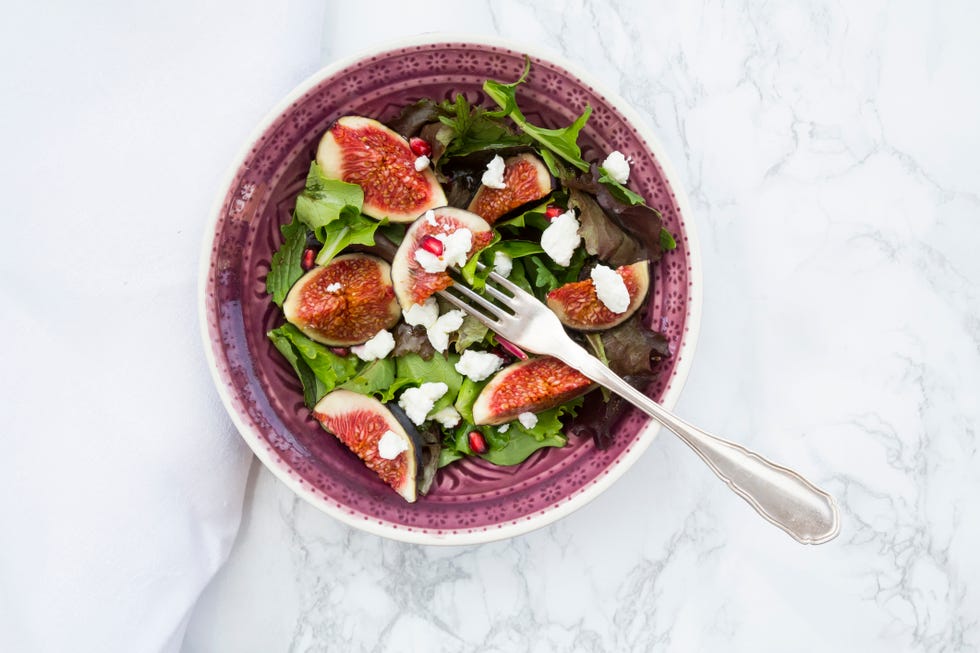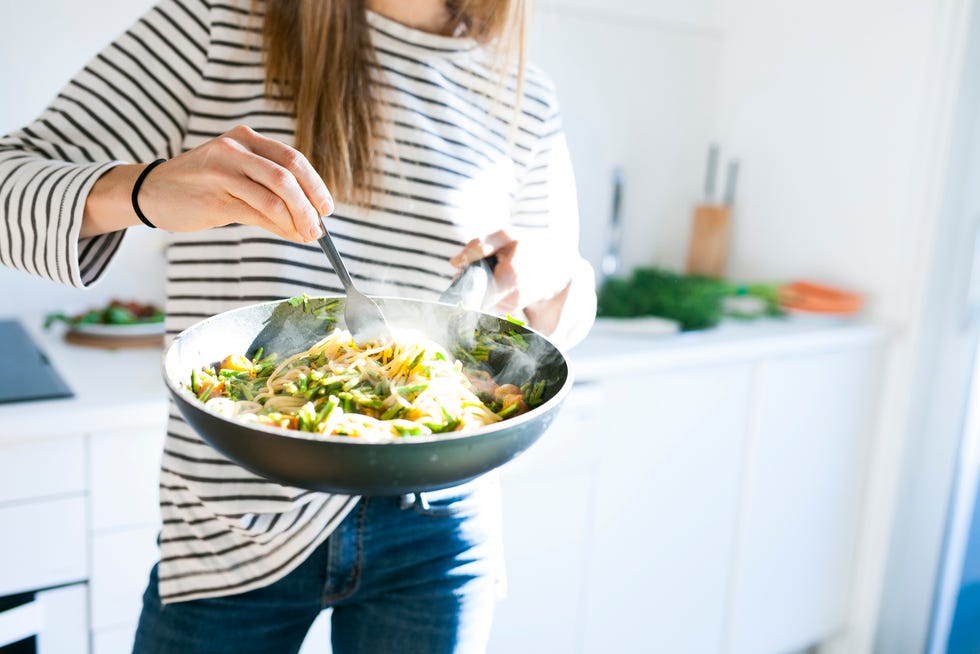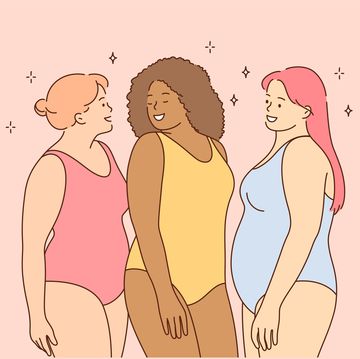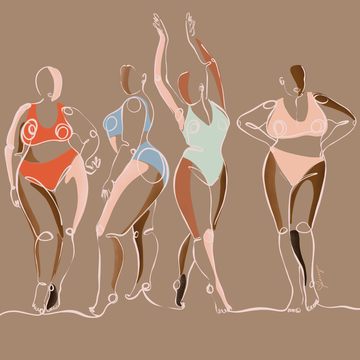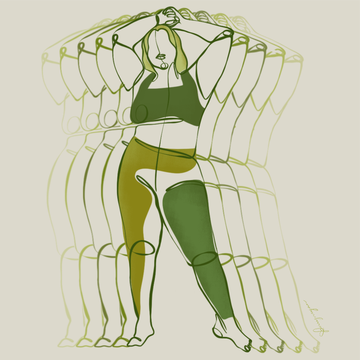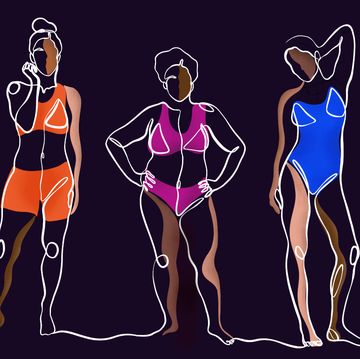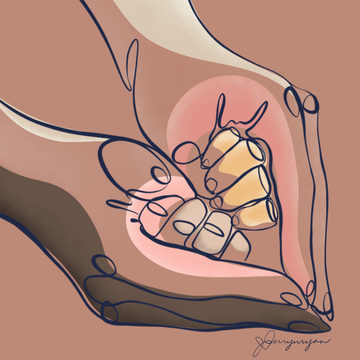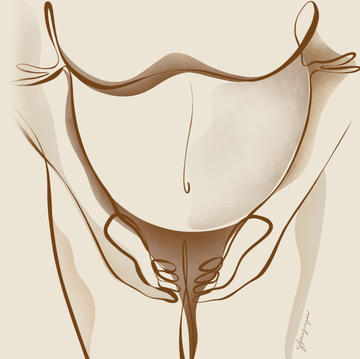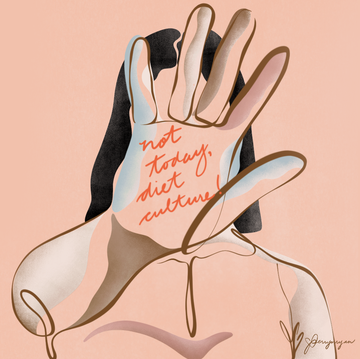- Intuitive eating is a philosophy that rejects traditional dieting and calls for listening to your body's own cues to decide what, when, and how much to eat.
- The approach isn't designed for weight loss but instead considers your mental and physical health holistically
- To get started, stop thinking of foods as "good" or "bad" and instead eat snacks or meals consistently (every 3-4 hours) with protein, fiber, and fat.
Following your body's hunger cues as a way to decide when to eat and when to stop may not seem revolutionary to some, but to others it's a whole new concept. Meet intuitive eating, the idea of ditching diet culture and getting in touch with your body first and foremost before making decisions about food.
The decades-old philosophy is back in the news — "The Latest Diet Trend Is Not Dieting," says The Atlantic — and it's an especially effective approach for anyone who has ever struggled with disordered eating behavior, or felt just a touch betrayed by the promises of traditional weight-loss diets.
So what is it and how do you start? Read on for the basics.
What exactly is intuitive eating?
Intuitive eating started with Evelyn Tribole, MS, RD, and Elyse Resch, MS, RDN, CEDRD, two registered dietitians who championed the lifestyle in the '90s. The philosophy rejects traditional weight-loss diets that promote restriction and deprivation of any type and encourages you to get truly in touch with how hungry or how satisfied you are in a given moment, and then use that information to inform how, what, and when you eat. It includes 10 core principles:
- Reject the diet mentality.
- Honor your hunger.
- Make peace with food.
- Challenge the food police.
- Respect your fullness.
- Discover the satisfaction factor.
- Honor your feelings without using food.
- Respect your body.
- Exercise — feel the difference.
- Honor your health.
The approach stems from research studies about health-related changes unrelated to weight loss. In fact, intuitive eating removes weight loss from the equation entirely — and it's not just about eating. For example, #9 is about doing physical activity that you actually enjoy, instead of getting on a spin bike because you want to lose weight or feel like you have to.
Does intuitive eating work for weight loss?
This is tough to answer, because intuitive is not — repeat, NOT — a weight-loss-promising diet of any type, nor is it a prescriptive eating plan. There are no rules to follow, only strategies designed to help you make informed choices about your personal health. For some, following your body’s own cues may help you lose weight as a secondary outcome, but the primary goal is to help you break up with traditional diet culture that has yet to help you lose weight in a meaningful way (a.k.a., without deprivation, restriction, and elimination).
While the data so far is promising for better health, the key measures of success — like body acceptance and self-esteem — are harder to measure in a consistent, qualitative way than pounds lost. That said, it’s also highly unlikely that you’ll gain weight either.
How is intuitive eating different from mindful eating?
They’re almost indistinguishable, but the main difference is that intuitive eating calls out "diet culture" specifically in its philosophy, while mindful eating focuses on the eating experience only. Intuitive eating has also been specifically studied in the treatment of disordered eating. Both reject the idea of eating for weight loss, or losing sight that you eat for nourishment and joy.
What are the benefits of intuitive eating?
Intuitive eating can help you regain confidence in your own eating habits and find freedom from "diet thoughts." I know how downright isolating it can feel to be overwhelmed by options at the grocery store, or betrayed by conflicting information you see on Facebook. Most of us have tried many times to cut out specific foods — only to find ourselves floundering. Intuitive eating is meant to help you to feel good about what you’re doing right now, but it's also a lifestyle-based approach, like Mediterranean eating patterns. It can help you lose weight if you find yourself eating for reasons that have little to do with how hungry or full you actually are, and more to do with specific feelings or personal triggers.
There don't seem to be any downsides to intuitive eating, so I’m certainly encouraging of anyone giving it a shot. When you take away some powerful triggers in your everyday life that attribute value to food, you get a much better sense of what you actually feel in a given moment and why you want to eat and when.
If I had any word of caution, it would be this: Consider your own personal boundaries when it comes to starting any new routine and the language used to uphold its tenants. Ultimately, something that triggers you to feel ashamed or isolated is really not for you.
How do I get started with intuitive eating?
If you've ever struggled with confusion about your own personal eating habits, here's how to apply an intuitive eating philosophy:
- Stop judging food as "good" or "bad." Attributing value to the food you eat and ultimately, the way you feel is giving food way too much power. It’s time to forget about "good" or "bad" foods, and lose the concept of "cheating" entirely. You eat meals that make up the course of your day — no food in isolation can make or break your health.
- Eat consistently. Have a snack or meal every 3 to 4 hours that includes protein, fiber, and fat. Most of us don’t eat enough in the a.m., so consider adding an extra egg, tablespoon of nut butter, or piece of cheese to your breakfast to really fill up and stay energized. My favorites: peanut butter toast, latte, and a banana; leftover stir-fried veggies and a fried egg; or a bar with a real, whole food as the first ingredient, like almonds.
- Stay hydrated. Your needs may vary, but women should generally drink about nine cups of water a day, according to the Mayo Clinic. Pick regular H2O, sparkling water, or really any unsweetened beverage. Extra fruit and veggies can help, so don’t forget about eating to stay hydrated, too.
- Get enough sleep. Getting those seven or eight hours per night can really affect your energy (and therefore hunger) levels. Don't forget the the USDA Dietary Guidelines for Americans recommends 300-400mg of caffeine daily, which translates into about 3 or 4 8-ounce cups of regular coffee.
- Restrict restriction: If weight-loss diets had an effect that lasted for life, then wouldn’t those things have worked by now? The principle "make peace with food" is a better mindset. Sometimes you may want to avoid a specific food based on the situation, like eating a big cheeseburger right before you board a rollercoaster, so consider choosing the foods you eat based on how you want to feel — before, during, and after mealtime.

A registered dietitian with a Bachelor of Arts degree from Northwestern University and a Master of Science degree in Clinical Nutrition from New York University, Jaclyn “Jackie” London handled all of Good Housekeeping’s nutrition-related content, testing, and evaluation from 2014 to 2019. Prior to joining GH, she was a clinical dietitian at Mount Sinai Hospital. Jackie has also appeared as an expert guest on The Dr. Oz Show and The Today Show. She is also author of the book Dressing on the Side (and Other Diet Myths Debunked).

